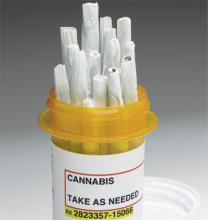This conflict between state and federal law has been the subject of considerable discussion in the professional literature and popular media, even reaching the Supreme Court.3,4 Much less attention has been paid to the parallel, but in some ways even more complicated, ethical, legal, and policy dilemmas facing administrators and practitioners in the Veterans Health Administration (VHA). Federal law governs VA health care facilities and clinical practice, yet there are VA hospitals and clinics in every state that have passed medical marijuana legislation, and veterans are eligible to obtain medical marijuana as residents of their respective states.
This article examines the evolution of VA policy regarding the use of medical marijuana within the confines of federal law and the nature of the VA as a beneficiary system with a mission to provide comprehensive health care to veterans and the legal, clinical, and ethical issues these often opposing obligations present to VA practitioners.
Completion of State Medical Marijuana Forms
In 2008, the VA Office of the General Counsel (OGC) issued to VA physicians the first official directions regarding state medical marijuana programs.5 The ruling of the VA OGC pertained to state medical marijuana registration forms and was addressed to the Under Secretary for Health. The VHA had requested guidance on how VA staff should respond when patients ask them to fill out state forms used to access medical marijuana; specifically, whether VA physicians are permitted or required to complete state medical marijuana registration forms.
The VA OGC was further asked to address the legal issues involved when a VA physician is requested to complete such a form and whether completion of such a form could result in criminal action or other penalties against the physician.
The opinion of the VA OGC issued in a memorandum on May 21, 2008, held that “VA should not authorize the completion of forms seeking recommendation or opinions regarding participation in such a program. Applicable statutes and regulations do not require VA physicians to complete such forms.”5 In response to the first question posed, the VA OGC identified the legal issues involved in the completion of the forms, arguing that the CSA designated marijuana as a Schedule 1 drug, meaning it had no accepted medical use but does have high potential for abuse. The Schedule 1 classification carried with it penalties for the dispensing, manufacturing, distributing, and possession of marijuana that were the responsibility of the Drug Enforcement Agency (DEA) to enforce.
In response to the second question, the VA OGC held that if a VA physician did complete a form permitting a patient to participate in a state medical marijuana program, this could result in DEA action, including revocation of the physician’s registration to prescribe controlled substances, as well as possible criminal charges.6 The VA OGC cited several landmark medical marijuana cases as the background to its issued opinion.
The first case cited in the VA OGC’s opinion was Pearson v McCaffrey, a 2001 ruling pertaining to the U.S. District Court of the District of Columbia.7 Barry McCaffrey, then-director of the Office of National Drug Control Policy, Donna Shalala, the secretary for the U.S. Department of Health and Human Services, and Janet Reno, attorney general, promulgated a policy that allowed the federal government to prosecute or revoke the controlled substance registration of any physician who prescribed or, more relevant to the VA situation, recommended medical marijuana to patients.
Physicians and patients in states with medical marijuana laws sought an injunction against the federal government prohibiting them from initiating civil, criminal, or administrative actions against physicians who recommended and prescribed or patients who obtained and used medical marijuana. The court refused to enforce the injunction the plaintiffs filed against the policy, finding that the federal position did not violate the First Amendment rights of the plaintiffs and, more pertinent, that Congress did have the authority under the Commerce Clause to regulate medical marijuana as a matter of public health and safety.7
Article 1, section 8, clause 3 of the U.S. Constitution grants that the U.S. Congress has the authority “To regulate Commerce with foreign Nations, and among the several states, and with the Indian tribes.”8 The Commerce Clause is often at issue in cases where the scope of federal power toward the states is challenged. The Commerce Clause is especially relevant to the legal status of state medical marijuana laws examined here because it is cited as the legal authority for the CSA, and the CSA governs practitioner prescribing.9

